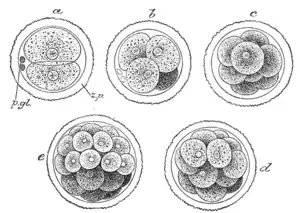桑葚胚
桑葚胚(拉丁文中的morus指的是桑葚的意思)是屬於胚胎的早期發育,包含囊胚腔外圍的細胞,包覆細胞外層的環帶稱為透明帶[1]。
| 桑葚胚 | ||
|---|---|---|
 | ||
| 囊胚形成:1 - 桑葚胚,2 - 囊胚 | ||
 | ||
| 一顆受精的哺乳動物卵子處於第一階段卵裂 剖面圖式講解:z.p.透明帶,p.gl.極體 a圖.二細胞時期 b圖.四細胞時期 c圖.八細胞時期 d、e圖. 桑葚胚時期 | ||
| Gray's | subject #6 46 | |
| 日數 | 3 | |
| 前體 | 合子 | |
| 發展結果 | 囊胚,囊胚腔 | |
桑葚胚是合子胚胎分裂一直到32細胞時期,整個形狀像一顆桑葚,所以被稱為桑葚胚[2]。 在受精數天之後,位於桑葚胚表面的細胞開始緊密接觸,讓細胞與細胞之間進行胞橋小體連結與間隙連接,這個變化是非常細微的,並不易查覺,這個過程稱為緻密化。[3][4]。在此之後桑葚胚的細胞释放黏性液體,造成桑葚胚中央形成孔洞,成為囊胚[5][6]。囊胚的外層細胞會形成最初的胚胎上皮細胞(滋養外胚層)。然而有些細胞會存留在內層,形成內細胞群或是多潛能幹細胞。其中內細胞群細胞會形成胚體,而滋養外胚層則形成胎盤以及其他胚胎組織[7][8][9][10]。
參見
參考資料
- Boklage, Charles E. . World Scientific. 2009: 217 [2011-07-13]. ISBN 9789812835130. (原始内容存档于2014-01-01).
- Sherman, Lawrence S. et al. (编). 3rd. Elsevier Health Sciences. 2001: 20 [2011-07-13]. ISBN 9780443065835. (原始内容存档于2020-05-26).
- Chard, Tim & Lilford, Richard. . Springer. 1995: 18 [2011-07-13]. ISBN 9783540199038. (原始内容存档于2020-05-26).
- Mercader, Amparo et al. . Lanza, Robert & Klimanskaya, Irina (编). . Academic Press. 2008: 343 [2011-07-13]. ISBN 9780123747419. (原始内容存档于2020-05-26).
- Patestas, Maria Antoniou & Gartner, Leslie P. . Wiley-Blackwell. 2006: 11 [2011-07-13]. ISBN 9781405103404. (原始内容存档于2020-05-26).
- Geisert, R.D. & Malayer, J.R. . Hafez, B. & Hafez, Elsayed S.E. (编). . Wiley-Blackwell. 2000: 118 [2011-07-13]. ISBN 9780683305777. (原始内容存档于2020-05-26).
- Morali, Olivier G. et al. . Savagner, Pierre (编). . Springer. 2005: 16 [2011-07-13]. ISBN 9780306482397. (原始内容存档于2013-09-21).
- Birchmeier, Carmen; et al. . Paul, Leendert C. & Issekutz, Thomas B. (编). . CRC Press. 1997: 208 [2011-07-13]. ISBN 9780824798246. (原始内容存档于2020-05-26).
- Nagy, András. . CSHL Press. 2003: 60–61 [2011-07-13]. ISBN 9780879695910. (原始内容存档于2020-05-26).
- Connell, R.J. & Cutner, A. . Cardozo, Linda & Staskin, David (编). . Taylor & Francis. 2001: 92 [2011-07-13]. ISBN 9781901865059. (原始内容存档于2020-05-26).
延伸閱讀
This article is issued from Wikipedia. The text is licensed under Creative Commons - Attribution - Sharealike. Additional terms may apply for the media files.